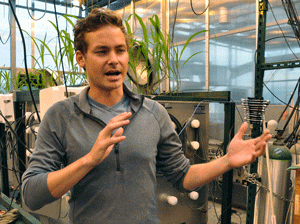One of the greenhouses at the University of Minnesota holds some unusual metal boxes. These large, metal containers hold soil from the Northfield, Minnesota area and simulate field conditions in a controlled way.
This is the Mesocosm Project lab led by Dr. Tim Griffis of Soil, Water, and Climate. Ten years in the making, after careful planning and design, it is collecting a constant steam of data about the emissions from agricultural soils under different precipitation regimes.

"These mesocosms create opportunities for us to simulate different climactic scenarios in ways that wouldn't be possible in the field," explains Ph.D. candidate Peter Turner. The equipment and greenhouse set up allows students and researchers to run experiments, controlling things like precipitation, temperature, and light and collect information on carbon dioxide, nitrous oxide, and methane emissions to analyze what climate change might mean for soil nutrient cycles. It also allows them to monitor the experiments in real-time, addressing any issues immediately, rather than finding out days later like they might out in the field.
The lab presents a unique resource for researchers and students at the University of Minnesota. While there are only six operational stations at this point, there will soon be six more that will expand research opportunities for students. Some of the stations in progress include a complete canopy enclosure, capturing whole ecosystem processes in a way that would be very difficult in the field.
"The hope is, with this data and experiments, we can get a real look at what climate change might mean for managed landscapes," says Matt Erickson, a project scientist who has been working on the lab and equipment. "With farmed and managed landscapes covering a large area of the world, it's important to get a real look on what is happening and what might occur in the future." The hope is the research done in these labs can lead to recommendations for mitigation and adaptation to climate change for farmers.
